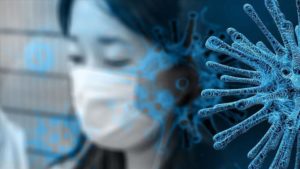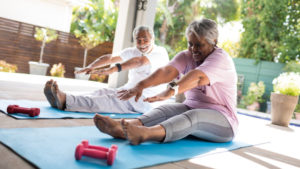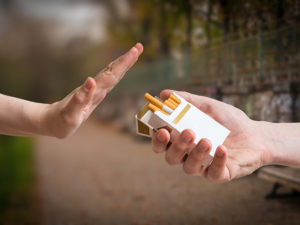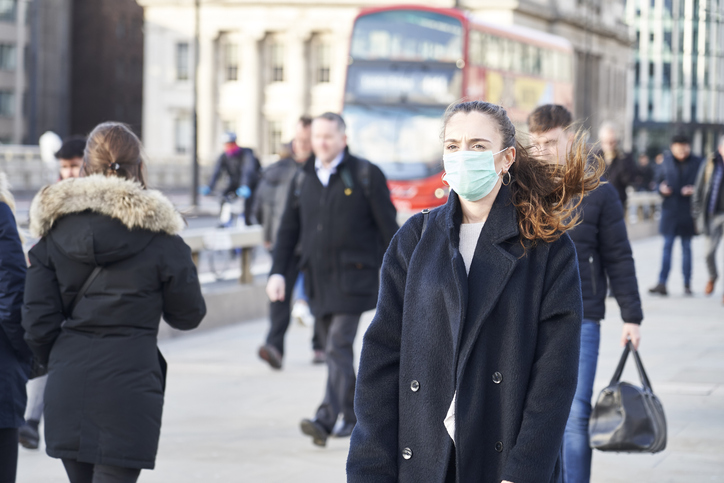
COVID-19 spreads primarily from person to person. Fighting this disease is our joint responsibility.
Protect yourself and others by making these simple precautions your new habits:
- Wash your hands often with soap and water for at least 20 seconds, especially after being in a public place, or after blowing your nose, coughing or sneezing. If soap and water are not readily available, use a hand sanitizer with at least 60% alcohol.
- Avoid touching your eyes, nose and mouth with unwashed hands.
- Avoid close contact with people who are sick, and practice social distancing by keeping at least 6 feet away from others if you must go out in public.
- Wear a cloth face covering to cover your mouth and nose when around others and when you must go out in public. The cloth face cover is meant to protect other people in case you are infected. Don’t place one on young children under age 2, anyone who has trouble breathing, or is unconscious, incapacitated or otherwise unable to remove the mask without assistance.
- Cover your nose and mouth with a tissue when coughing or sneezing and throw the tissue away after use. If a tissue isn’t available, cough or sneeze into your elbow or sleeve, not your hands.
- Clean and disinfect frequently touched surfaces daily. This includes tables, doorknobs, light switches, handles, desks, computers, phones, keyboards, sinks, toilets, faucets and countertops.
In line with this, more and more research is showing that the key to lifelong good health is what experts call “lifestyle medicine” — making simple changes in diet, exercise, and stress management. To help you turn that knowledge into results, we’ve put together this manageable list of health and wellness suggestions which is beneficial in today’s world.
1. THINK POSITIVE AND FOCUS ON GRATITUDE

Research shows a healthy positive attitude helps build a healthier immune system and boosts overall health. Your body believes what you think, so focus on the positive. Since gratitude allows you to see the world in a positive light, it decreases the probability of you focusing on things that negatively impact your life. This, in turn, will help you become mentally strong, confident, and have a higher self-esteem.
In positive psychology research, gratitude is strongly and consistently associated with greater happiness. Gratitude helps people feel more positive emotions, relish good experiences, improve their health, deal with adversity, and build strong relationships.
2. GET REGULAR EXERCISE

The health benefits of regular exercise and physical activity are hard to ignore. Everyone benefits from exercise, regardless of age, sex or physical ability. Exercise can help prevent heart disease, stroke, diabetes, and colon cancer. It can help treat depression, osteoporosis, and high blood pressure. People who exercise also get injured less often. Routine exercise can make you feel better and keep your weight under control. Try to be active for 30 to 60 minutes about 5 times a week. Remember, any amount of exercise is better than none.
Remember to check with your doctor before starting a new exercise program, especially if you have any concerns about your fitness, haven’t exercised for a long time, have chronic health problems, such as heart disease, diabetes or arthritis.
3. GET A GOOD NIGHT’S SLEEP

If you have trouble sleeping, try relaxation techniques such as meditation and yoga. Or eat a small bedtime snack of foods shown to help shift the body and mind into sleep mode: whole grain cereal with milk, oatmeal, cherries, or chamomile tea. Darken your room more and turn your clock away from you. Write down worries or stressful thoughts to get them out of your head and onto the page. This will help you put them into perspective so you can quit worrying about them.
4. DON’T SMOKE OR USE TOBACCO

Smoking and tobacco use are harmful habits. They can cause heart disease and mouth, throat, or lung cancer. They also are leading factors of emphysema and chronic obstructive pulmonary disease (COPD). The sooner you quit, the better.
Tobacco contains nicotine chemical that causes a tingly or pleasant feeling — but that feeling only lasts for a little while. Nicotine is also addictive. That means that if you start to use nicotine, your body and mind will become so used to it that you’ll need to have it just to feel OK. It also can make it more difficult for blood to move around in the body, so smokers may feel tired and cranky. The longer you smoke, the worse the damage becomes.
5. PROTECT YOUR SKIN

Since your skin plays such an important role in protecting your body, you should keep it as healthy as you can. This will help you keep from getting sick or having damage to your bones, muscles, and internal organs.
Sun exposure is linked to skin cancer. It’s best to limit your time spent in the sun. Be sure to wear protective clothing and hats when you are outside. Use sunscreen year-round on exposed skin, like your face and hands. It protects your skin and helps prevent skin cancer. Choose a broad-spectrum sunscreen that blocks both UVA and UVB rays. It should be at least an SPF 15. Do not sunbathe or use tanning booths.
6. USE FOODS OVER SUPPLEMENTS

Supplements are not a substitute for a good diet. Although many health experts recommend taking a multivitamin and mineral supplement that provides 100 to 200 percent of your recommended daily value, each and every supplement should be carefully evaluated for purity and safety. Specific supplements have been associated with toxicity, reactions with medications, competition with other nutrients, and even increased risk of diseases such as cancer, heart disease, and diabetes.
No matter where you live, we ask that you continue protecting yourself and others by practicing physical distancing and other preventative measures.
COVID-19 Resources
- World Health Organization: WHO website










